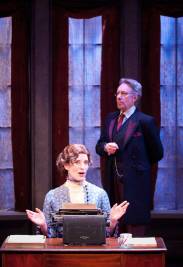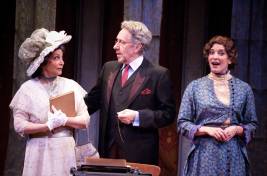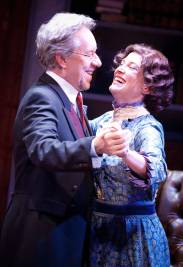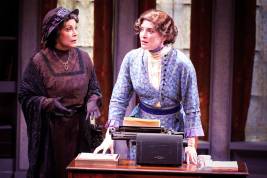
Wikipedia defines a “ghostwriter” as someone who “writes books, articles, stories, reports, or other texts that are officially credited to another person.” Add a hyphen and a “ghost-writer” is something quite different indeed—or so we learn in Michael Hollinger’s Ghost-Writer, now getting a classy West Coast Premiere at Long Beach’s International City Theatre.
 The ghost in question is that of deceased novelist Franklin Woolsey. And as for the writer? Well, therein lies the question in Hollinger’s intelligent, witty musing on the nature of creation and love, creatively and lovingly directed by caryn desai and performed by a sterling cast of three on the ICT stage.
The ghost in question is that of deceased novelist Franklin Woolsey. And as for the writer? Well, therein lies the question in Hollinger’s intelligent, witty musing on the nature of creation and love, creatively and lovingly directed by caryn desai and performed by a sterling cast of three on the ICT stage.
Woolsey’s typist Myra Babbage (Paige Lindsey White) maintains that even now, months after her employer’s death, the words she’s putting on paper come directly from Woolsey. His widow Vivian (Cheryl David) insists that the much younger woman is nothing more than a charlatan, and in it for the fame and fortune. As for Woolsey (Leland Crooke) himself, well you’d have to be a psychic to divine the answer to that one.
 Hollinger (whose other plays include Opus, Incorruptible, and An Empty Plate in the Cafe du Grand Boeuf) takes as his inspiration an anecdote he once read about late 19th-early 20th Century novelist Henry James, whose secretary claimed still to be receiving dictation from him even after his death. Originally conceived of as a solo piece, perhaps half of Ghost-Writer remains so, Myra “conversing” with an unseen interloper hired by Vivian to ferret out the truth. Hollinger’s decision to add the Woolseys to the mix proves a wise one. Still, much of Ghost-Writer remains a series of long monologs, and as StageSceneLA readers may have come to surmise, solo pieces are not usually this reviewer’s cup of tea.
Hollinger (whose other plays include Opus, Incorruptible, and An Empty Plate in the Cafe du Grand Boeuf) takes as his inspiration an anecdote he once read about late 19th-early 20th Century novelist Henry James, whose secretary claimed still to be receiving dictation from him even after his death. Originally conceived of as a solo piece, perhaps half of Ghost-Writer remains so, Myra “conversing” with an unseen interloper hired by Vivian to ferret out the truth. Hollinger’s decision to add the Woolseys to the mix proves a wise one. Still, much of Ghost-Writer remains a series of long monologs, and as StageSceneLA readers may have come to surmise, solo pieces are not usually this reviewer’s cup of tea.
It may be for this reason that it took me a good while to get into Ghost-Writer, though not through any fault of the marvelous White, quite simply brilliant (and letter-perfect) in one of the year’s most challenging roles.
For Ghost-Writer’s first half-hour or so, it’s just Myra, her typewriter, and her invisible guest (for whom we in the audience are the stand-in), and not surprisingly (and despite bits of humor and a good number of delicious, deliberate beats and pauses), Hollinger’s writing can get rather talky.
Fortunately, once Myra starts interacting with Franklin in flashbacks and with Vivian in the widow’s frequent visits to the upstairs room her husband had rented to help in the creative process, Ghost-Writer picks up considerable steam, so that by its final, moving moments, this reviewer did indeed find himself under its spell.
 Some of Ghost-Writer’s most memorable sequences come from the interplay between its attractive young heroine and her considerably older employer. Verbal sparring over a (Myra claims) misused semi-colon turns into a kind of flirtation. A touch of Franklin’s hand on Myra’s arm leads her, she tells us, to wear three-quarter sleeves “more and more often.” And a scene in which Myra teaches Franklin to fox-trot proves irresistible.
Some of Ghost-Writer’s most memorable sequences come from the interplay between its attractive young heroine and her considerably older employer. Verbal sparring over a (Myra claims) misused semi-colon turns into a kind of flirtation. A touch of Franklin’s hand on Myra’s arm leads her, she tells us, to wear three-quarter sleeves “more and more often.” And a scene in which Myra teaches Franklin to fox-trot proves irresistible.
Then there is Vivian, imperious in her initial visits, suspicious of Myra’s relationship with her husband, and envious that the time he used to spend with her he now passes with a woman half his (and Vivian’s) age. Later, Vivian’s calls on Myra following Franklin’s death reveal a grieving widow’s vulnerability and longing.
White, recently seen in Michael Elyanow’s extraordinary ensemble piece The Children, bears the lioness’s share of lines and stage time in Ghost-Writer and comes out triumphant in one of the year’s most stunning, nuanced performances. David is never less than excellent in any role she undertakes, and her Vivian is another memorable creation, acerbic, occasionally vindictive, and deeply wounded. Crooke is terrific too, and it’s a delight to observe the subtle changes in dry-as-parchment Franklin as he falls under Myra’s spell.
 Set designer Staci Walters and ICT resident property designer Patty and Gordon Briles have joined forces to create a meticulously detailed early 20th Century “austere furnished room” complete with vintage typewriter, candlestick telephone, and His-Master’s-Voice Victrola. Donna Ruzika’s accomplished lighting design cues us in to Ghost-Writer’s many time shifts. Resident costume designer Kim DeShazo and hair and wig designer Anthony Gagliardi make Myra, Franklin, and Vivian look period perfect. Best of all is Dave Mickey’s superb sound design, one which begins even before the play has started, welcoming the audience with the clickety-clack of invisible typewriter keys, integrating numerous effects throughout the play, and making Ghost-Writer’s final moments all the more powerful with an inspired design choice.
Set designer Staci Walters and ICT resident property designer Patty and Gordon Briles have joined forces to create a meticulously detailed early 20th Century “austere furnished room” complete with vintage typewriter, candlestick telephone, and His-Master’s-Voice Victrola. Donna Ruzika’s accomplished lighting design cues us in to Ghost-Writer’s many time shifts. Resident costume designer Kim DeShazo and hair and wig designer Anthony Gagliardi make Myra, Franklin, and Vivian look period perfect. Best of all is Dave Mickey’s superb sound design, one which begins even before the play has started, welcoming the audience with the clickety-clack of invisible typewriter keys, integrating numerous effects throughout the play, and making Ghost-Writer’s final moments all the more powerful with an inspired design choice.
Sandy Fury is production stage manager. Michael Donovan, CSA, is resident casting director.
Wordy as it is, Ghost-Writer may not be to everyone’s taste. It risked for a while not being mine. Still, with White’s fingers tapping on that antique keyboard and investing Myra with such emotional depth, it’s hard to imagine anyone not ending up touched by her words. (Or are they Franklin’s? I’ll leave that up to you to decide.)
International City Theatre, Long Beach Performing Arts Center, 300 E. Ocean Blvd., Long Beach.
www.InternationalCityTheatre.org
–Steven Stanley
August 24, 2012
Photos: Suzanne Mapes


 Since 2007, Steven Stanley's StageSceneLA.com has spotlighted the best in Southern California theater via reviews, interviews, and its annual StageSceneLA Scenies.
Since 2007, Steven Stanley's StageSceneLA.com has spotlighted the best in Southern California theater via reviews, interviews, and its annual StageSceneLA Scenies.







 COPYRIGHT 2024 STEVEN STANLEY :: DESIGN BY
COPYRIGHT 2024 STEVEN STANLEY :: DESIGN BY